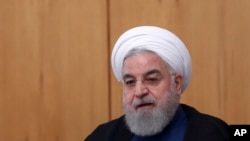President Hassan Rouhani said Wednesday that Iran supports a plan by European countries to bolster a nuclear deal that Tehran reached with the West in 2015 and from which the United States withdrew last year.
Rouhani said the plan included preventing Iran from obtaining nuclear weapons, securing its support for regional peace, lifting U.S. sanctions and the immediate resumption of Iranian oil exports.
Speaking during a weekly cabinet meeting, Rouhani said: “We agree with the general framework by the Europeans.” France, Britain and Germany had urged Tehran to enter talks about a new arrangement on the nuclear deal.
Rouhani's comments come amid heightened tension between Tehran and Washington following U.S. President Donald Trump's decision over a year ago to unilaterally pull out of the nuclear deal with Iran. The U.S. has imposed sanctions that have kept Iran from selling its oil abroad and have crippled its economy. Iran has since begun breaking terms of the deal.
Rouhani said Iran has never been after nuclear weapons and whenever the rights of the Iranian nation are considered in plans and negotiations, “the road is not closed, and the road is again open.”
Rouhani said the plan could have been discussed during his New York visit last week to attend the U.N. General Assembly but that President Donald Trump scuppered chances by openly threatening to impose more sanctions.
He said Trump in a private message had told the Europeans he was ready but later told media outlets he wanted to intensify sanctions. Rouhani expressed gratitude for efforts by President Macron regarding the plan.
Foreign Minister Mohammad Javad Zarif told state TV later Wednesday that even though Macron's four-point plan did not include Iran's views, “it is necessary that negotiations continue in an accurate way. We will continue the communications.”
Without elaboration, Zarif said Japan's Prime Minister Shinzo Abe is applying efforts, too.
Zarif said Iran has always wanted security in the Persian Gulf and if its rival Saudi Arabi changes its regional policy, it will find “open arms” from Iran.
“We have always said we are not after tensions with our neighbors,” he said.
Trump pulled the U.S. from the nuclear deal between Iran and world powers and re-imposed sanctions on Iran as part of a “maximum pressure” policy that sent the country's economy into free fall.
But Iran's Supreme Leader Ayatollah Ali Khamenei said Wednesday that approach has failed.
“Recently and through their European friends, they also begged to force our president to meet (Trump) to make a symbolic status for making Iran surrender,” state TV quotes Khamenei as saying during a meeting with elite Revolutionary Guard members. “They eventually did not succeed and the policy will definitely fail until the end.”
During the meeting, Guard chief Gen. Hossein Salami reiterated Iranian officials' traditional stance toward Israel, saying any military move by the Jewish state against Iran would lead to its destruction.
“The slightest error by the Zionist regime before Iran will be the last one and it will lead to disappearing the Zionist regime from the world,” said Salami.
Khamenei, who has final say on all state matters, has repeatedly expressed pessimism about Europe's intentions for saving the nuclear deal, which aimed at preventing Iran from obtaining nuclear weapons in return for lifting sanctions. Iran has routinely denied seeking a nuclear weapon.




